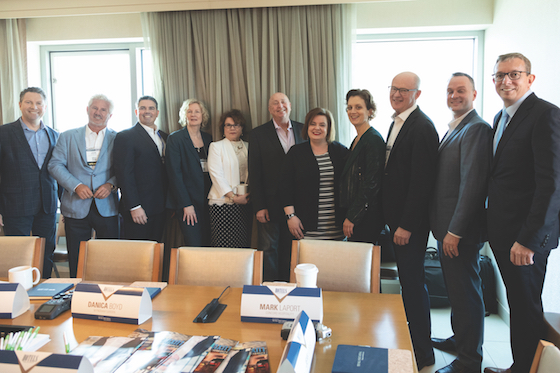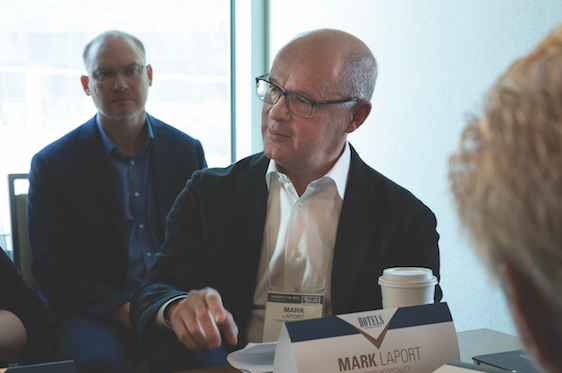In January, before the coronavirus had reshaped 2020 and the global hotel industry, HOTELS conducted a roundtable panel with leading brand executives to talk about how and where they find inspiration to address professional challenges and opportunities.
A lot has changed since that session, sponsored by the Wall Street Journal and held just before the start of BHN’s Americas Lodging Investment Summit in Los Angeles. We went back to the panelists later in the year to find out how they are leading and managing in the pandemic (read the story here). In today’s story, we find out what inspires these leaders to keep innovating.

H: What inspires you and helps you in your decision-making and ideation?
Jeff Voris, senior vice president, global design strategies, Marriott International: I spend a lot of time when we’re on property watching guests and looking for that look in their eye when they get that moment of ‘wow,’ because they walk into a place or have a great interaction with an associate. That is everything to me. Having come from entertainment (Disney), that’s the whole goal – that emotional connection. That’s the base of what we do, and that definitely fires me up…
When we talk about inspiration, a physical place is this for me… I’ve always loved California, particularly Southern California, because it is founded on hope and optimism. A lot of people kept going west until they hit water, looked for sun, and came here to follow their dreams. Sometimes that’s misplaced hope, but it’s there. You find a lot of seekers, and to me that’s very inspiring. People who are asking questions all the time. Going to a place can re-energize and get us out of the context we’re normally in.
John Cohlan, co-founder, Margaritaville: The beauty of what I’ve been lucky enough to get to do crosses all kinds of socio-economic barriers… What you end up having is an incredible social experiment. You look at these people when you’re sitting in that lobby and they are of very different backgrounds. But they all know that the other people who are there share something.
Danica Boyd, formerly head of Wyndham Garden brand: I don’t know if most people notice, but we spend less than 7% of our time outside… In my family, we’re committed to being inspired and connect outside in nature. We have a camper and we park it in Pennsylvania. We go there on the weekends. There are no remote controls for video games. My kids are biking, fishing and hiking, and my husband and I are connecting over a campfire.
Chris Silcock, EVP and chief commercial officer, Hilton: If you’ve had a tough day doing the things that drain your energy, then for me the gym is such an important thing – not for the health benefits, but for the mental benefits of doing something purely for yourself and challenging yourself in a way that is physical, not just mental. If I do that every day, it just makes a huge difference in how effective I can be.
Mark Laport, president and CEO, Concord Hospitality: When I do break away, I love global travel. It’s really cool to go to hotels that don’t have brands. All our hotels have brands and I’m a brand believer. But to go to Paris or Italy or China and see how other people do it in an unbranded context is really fun. I come back with learnings and refreshed.

H: Mark, where do you find inspiration to drive Concord Hospitality?
Laport: This is going to sound too simple, but the answer is simple. I’ve worked hard to find people that are like-minded. We’re friends. We mix it up. We don’t worry about arguing together. It’s that spirit that drives us forward in a positive way. It’s igniting. The enthusiasm, the passion – it’s all really cool and very powerful stuff.
H: What non-hotel industry company, business or leader have you found compelling?
Voris: I spent 13 years at Disney, and there are a lot of parallels. In hospitality we are so focused on creating that great emotional engagement with our guests. Disney is fantastic at that.
It also gets to the previous question because my identical twin brother is the chief technology officer of The (Disney) Studio. We spend a lot of time talking about how our worlds collide and how they influence each other.
Jim Tierney, senior vice president, development and owner relations, Hyatt Place and Hyatt House: Two that stick out to me are Nordstrom and Whole Foods – from a customer experience. If you look at their mission statements and the core values, it’s really about caring for their employees and guests. They look after the communities in which they operate, keeping their connections, and all the stuff that we talk about today.
Silcock: I have been amazed at what I am learning from watching my son. My son is now 17. He is into the gaming community, the technology they use, the way they engage with each other… Now, sharing with him what’s going on at work and hearing his opinions is just incredible. I see how different they learn, how different they’re engaging with their friends, and it is a lesson and something we have to pay very close attention to.
Julienne Smith, senior vice president, development, IHG Americas: One of the retailers who really broke the mold is Zappos. First of all, they have a great app, but they think about the customer first. Free returns for a year. Free shipping. All of that. But what’s different is they train their colleagues who answer the phones to solve problems. You’re not forwarded on to the next person, or on hold for 20 minutes. I’m loyal to them because it’s so easy. I feel like my needs are first.
H: What you’ve done to reflect on your processes and take them forward?
Heather McCrory, CEO, North and Central America, Accor: I’ve been in my role for a year now. The pace just continues to grow, I think, for all of us. It just gets faster and faster and faster. With that, we make decisions faster and faster. But I have found probably in the last four or five months that it is OK to stop making decisions. Park it. Let’s think about it. Sleep on it, think about it for a little bit, and then you come up with a much better decisions than when on that treadmill.
It really is a discipline for me almost to say, ‘OK. I am not going to just answer, go, go, go. Let’s do it, let’s do it.’ Get some facts and just really slow it down. To me, it’s really important today with everything going so fast to sleep. It is an incredible incubator for thinking.
It’s hard to stop yourself from actually getting on that treadmill and to slow it down. That, to me, is a discipline I don’t necessarily know if I always practice, but I’m trying to.
Silcock: It’s very easy when people come up with new ideas to immediately come up with a practical reason why they can’t work. It’s important to really control myself and not allow my experiences step in the way of ideas, and let the ideas play out… For example, last year we launched a new price structure… My immediate reaction when people wanted to make this change was to think about the 6,100 hotels, the thousands of people and systems that historically have been very hard to change. By stopping myself and allowing, in some cases, new people to follow that path we came up with a new price structure that was valuable for customers and for hotels, and it moved us forward.
H: What are your hacks for getting the most out of your business relationships?
McCrory: The number one skill, and I think it’s really, really important to relationships, is listening. Today, we’re all about going so quickly. But to really build a relationship with someone, you actually have to actively listen, participate, and sometimes I think we’re just on that treadmill. Even for people you’ve known for a really long time, it’s easy to lose track… I don’t think I’m necessarily the best listener all the time. It’s something that is key to that relationship.
Smith: Presence is key. I’ll go back to the yoga practice again. Getting into your body and thinking about what you’re doing – just being mindful of the motion or whatever I’m doing allows me to create presence with other aspects of my life. Listening is key, but actually being there and connecting is key, and the people who call me out on it the most are my kids.
Voris: Hand in hand with that is asking questions… There’s a famous, historical story about Mr. Marriott having been asked when he was a young man by the President, ‘What do you think?’ That’s just baked into everything we do. It’s so valuable at a property when you go and ask somebody, ‘What do you think? What would you do here?’ Not only does it really value them, often you get a much better answer than you would have had.

